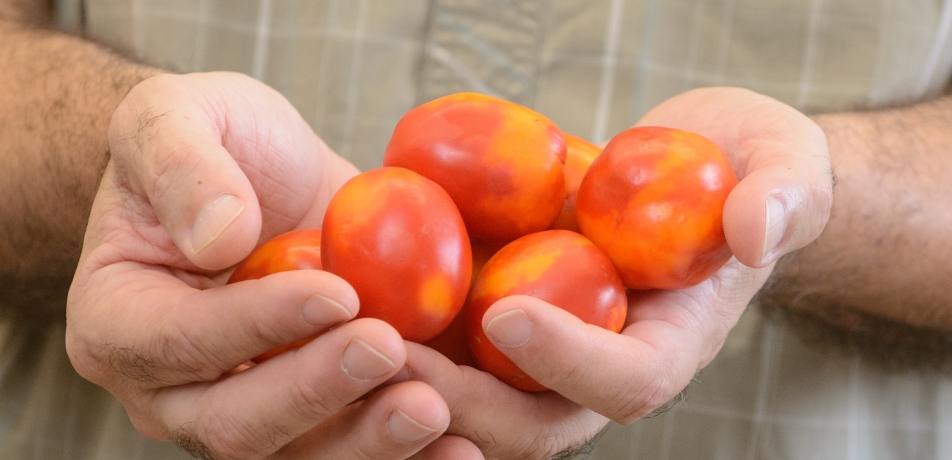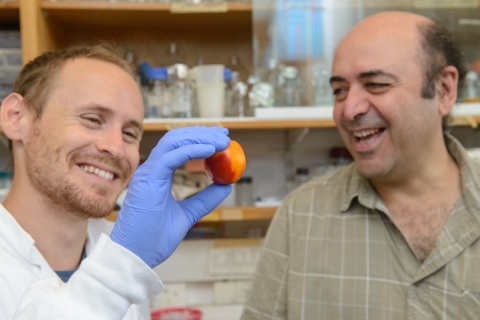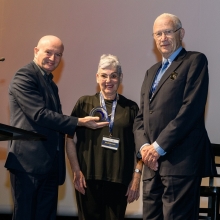Editing the plant genome
Features

Since the earliest days of agriculture, farmers have been selecting plants with desirable characteristics out of natural variants. More recently, crossbreeding helped them make new, even more desirable specimens.
But the search for the “perfect plant,” combining the best traits from both parents, requires screening thousands of plants bred over successive generations—a process that can take years.
Now, Weizmann Institute plant scientist Prof. Avraham Levy and his team have achieved proof-of-concept for a CRISPR-based technique that enables precise customization of a plant’s genetic make-up in a single generation. This breakthrough technique makes it possible to redesign plant genomes - from the editing of single genes to the exact engineering of chromosomes - achieving what farmers have always dreamed of: an efficient path to precise crop design.
Genomic editor-in-chief
Prof. Levy is a member of the Department of Plant and Environmental Sciences, and is the incoming Dean of the Faculty of Biochemistry. He is a pioneer in the study of something called DNA double-strand break repair - a natural process in which the plant cell’s genetic machinery fixes damage occurring in both strands of the DNA double helix. One way that such breaks can be repaired is through genomic “recombination” - a phenomenon in which extended segments from the parental chromosomes are randomly exchanged, generating new genetic combinations as well as new traits.
Prof. Levy and his team recently demonstrated for the first time how recombination can be transformed from a random event into a process that can be scientifically directed, in order to achieve specific agricultural outcomes.
The researchers relied on a revolutionary molecular tool called CRISPR-Cas, which makes it possible to cleave the genome at specific sites (“Cas” is the name of the enzyme responsible for cutting DNA). Using this tool, they directed the recombination of targeted chromosomal segments, allowing the nonrandom alteration of multiple traits in plant progeny. Significantly, these dramatic changes took place over a single generation, establishing CRISPR-Cas as a highly efficient tool for precise breeding of crop plants.
Prof. Levy’s achievement, for which a patent application has been registered, demonstrates how CRISPR-Cas can drive non-random “chromosome editing” in order to achieve specific results in plants.
Using this method, he says, “we took advantage of recombination - one of the cell’s natural strategies for repairing double-stranded breaks - and produced a complex desired result. CRISPR-Cas gives us the means to choose the best from both parents, for example, combining the high-yield characteristics of the ‘dad’ plant with the high disease resistance of the ‘mom’, using just a handful of plants.”
Editing individual genes
The recent work also demonstrates how CRISPR-Cas can efficiently target and modify specific gene-linked traits. As a proof of concept, the Levy team used the method to edit fruit color, producing yellow-colored tomatoes from red tomato parents. This result was achieved using only a few plants - compared to the several thousand required to introduce desired traits into the plant genome by conventional, random methods - and in a single generation.
”With this new technique, we can effect change faster than practitioners of traditional crossbreeding could ever have imagined,” Prof. Levy says. “In terms of both specificity and speed, CRISPR-Cas gives us enormous control over traits in the crops we grow. We’ve just begun to explore it, but it looks like it may be a real revolution in science-driven agriculture.”
Prof. Avraham Levy is funded by The Y. Leon Benoziyo Institute for Molecular Medicine which he heads, European Research Council, Leona M. and Harry B. Helmsley Charitable Trust, Dana and Yossie Hollander, Israel, The Dr. Erhard, Emmi, and Fred Loewinsohn Center for Pediatric Health which he heads, Tom and Sondra Rykoff Family Foundation Fund. Prof. Levy is the incumbent of the Gilbert de Botton Professorial Chair of Plant Sciences.

MSc student Offir Lupo and Prof. Avi Levy








